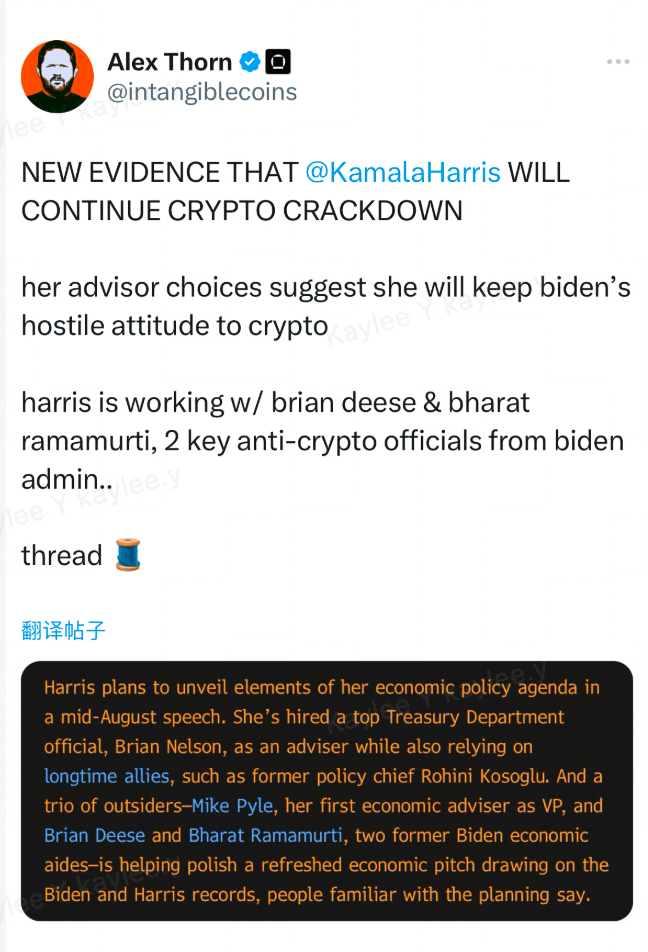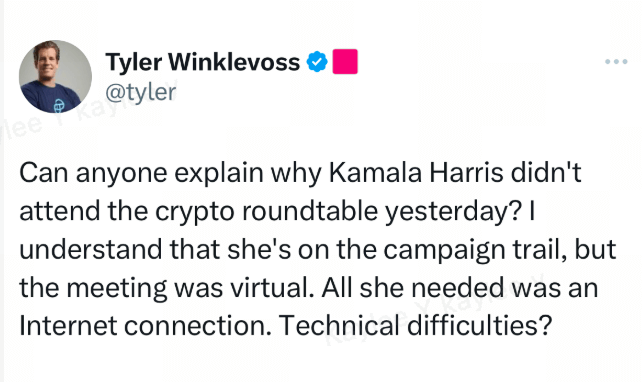MEXC Exchange/Learn/Market Insights/Hot Topic Analysis/Harris Team's Latest Update: Is the Crypto Industry Gaining Support or Just Empty Promises?
Harris Team's Latest Update: Is the Crypto Industry Gaining Support or Just Empty Promises?
Related Articles
Introduction
Recently, developments in the U.S. election have attracted widespread attention within the industry. According to Polymarket data, as of August 24, Kamala Harris's chances of winning the 2024 U.S. presidential election have risen to 49%, while Donald Trump's chances have dropped to 50%. As a leading candidate for the 2024 election, Harris's stance on the cryptocurrency industry is receiving significant scrutiny. After all, in the cryptocurrency sector, policy directions often impact the market's trends and development trajectory.
Recently, comments made by Circle CEO Jeremy Allaire have sparked widespread discussion within the industry. He revealed that Kamala Harris's presidential campaign team is actively engaging with the crypto industry. This move is interpreted as a sign that Harris might adopt a more favorable stance on crypto in future policies. However, some view it as merely a election promise aimed at winning votes. So, what does this news really mean for the crypto industry? Let’s take a closer look.
1. Harris Team's Proactive Engagement: Background and Motivation
Kamala Harris, as the current Vice President of the United States, has accumulated significant experience on the political stage. However, Harris's stance on crypto has been notably vague and cautious. Although her campaign team is engaging with the crypto industry to ease the tensions between the Democratic Party and the crypto sector, Harris herself has not made any clear public statements about the crypto market. Her campaign has also not participated in key cryptocurrency-related meetings, such as the "Crypto4Harris" online event, nor has it made any commitments to the crypto industry.
Current indications suggest that Harris might continue the strict regulatory policies of the Biden administration. This stance is supported by her running mate, Walz, who has explicitly advocated for more stringent regulation on crypto. Additionally, Harris's team has been closely working with some anti-crypto officials, further intensifying concerns in the market about the possibility of increased regulation. For instance, a recent post by Alex Thorn, Head of Firmwide Research at Galaxy Digital, on X (formerly Twitter) corroborated this. He believes that Harris might continue Biden's hostile policies as she has included two anti-crypto officials from the Biden administration (Brian Deese and Bharat Ramamurti) in her team.

Harris's campaign team's interactions with crypto companies like Circle and Coinbase may hint at some policy concessions. However, Harris's ambiguous stance on cryptocurrency and potential regulatory positions continue to leave the crypto market feeling uneasy. Allaire's comments indicate that Harris's campaign team is not only actively engaging with key figures in the crypto industry but is also working to gain a deeper understanding of cryptocurrency-related policies. Industry insiders believe that her proactive approach may be driven by several motivations:
- Forward-looking Policy Making: As a burgeoning market, cryptocurrency regulation is continually evolving. Understanding the complexity and diversity of this field is crucial for crafting effective policies.
- Expanding Voter Base: The number of crypto investors and tech enthusiasts in the U.S. is steadily increasing, and their votes could play a critical role in future elections. Harris's team aims to engage this group to gain their support.
- Economic Policy Adjustments: Crypto involves not only technology but also economic and financial policies. Harris's team may be seeking to develop a policy framework that supports technological innovation while ensuring financial stability.
2. Virtual Roundtable Controversy: Absence Sparks Debate
On August 8, Allaire participated in a virtual roundtable meeting that included White House officials, Harris campaign representatives, U.S. legislators, and industry leaders. The core focus of the meeting was the bipartisan nature of cryptocurrency and its importance to voters. Participants discussed how crypto has become a point of cross-party attention and explored potential directions for related policies. Allaire pointed out that the event not only highlighted the political polarization of crypto issues but also demonstrated the profound impact of this issue on voters. Bipartisan interest means that cryptocurrency issues will become a significant topic in the 2024 election, which will undoubtedly intensify the competition among various parties in policy-making.
Given that Harris has just been nominated as a presidential candidate and is likely busy, it might be understandable that she missed the Bitcoin Conference at the end of July. However, her absence from this virtual roundtable has sparked widespread skepticism within the crypto industry. During the meeting, prominent figures from the crypto sector, including Ripple executives Brad Garlinghouse and Chris Larsen, as well as Uniswap CEO Hayden Adams, engaged in discussions with Democratic officials. As a representative of the Democratic Party, Harris was expected to attend. Consequently, Gemini co-founder Tyler Winklevoss publicly questioned the reasons for Harris’s absence on X (formerly Twitter), expressing his dissatisfaction. This move has reignited industry-wide doubts: does she truly care about cryptocurrency?

3. Industry Expectations and Challenges
Harris's team's engagement seems to bring new hope to the crypto industry, but it also presents some challenges. The industry has high expectations for clarity on Harris's future economic policies, hoping she can balance financial stability with support for innovation. Currently, the crypto market is experiencing volatility and uncertainty, and individuals in the industry are looking for policymakers to provide clearer guidance to mitigate the risks associated with uncertainty.
Arca's Chief Investment Officer, Jeff Dorman, has noted that while a Trump victory might be more beneficial for the cryptocurrency market, Harris' victory wouldn't necessarily be as detrimental as some fear. He also mentioned that prominent Democrats like Nancy Pelosi and Chuck Schumer have recently supported crypto-friendly legislation, indicating a shift in the party's stance. The engagement of Harris's team also reminds us that policy-making is not just a technical issue but involves broader socio-economic considerations. Finding a balance between regulating innovation and ensuring financial security will be a key issue in future policy discussions.
In the current policy dynamic, major trading platforms are actively monitoring developments. For instance, as a leading cryptocurrency trading platform, MEXC is closely following the latest movements of Kamala Harris’s team. MEXC is not only a major player in the crypto market but is also renowned for its efficient trading experience and diverse investment opportunities. The platform is committed to providing cutting-edge trading experiences and top-notch services in an ever-changing market environment. Known for its precise market insights and swift response capabilities, MEXC captures market dynamics and user needs promptly. Its token listing mechanism is efficient and flexible, with a wide range of tokens and impressive listing speeds, maintaining its leading industry position. MEXC also attracts a large user base with its low fees and high returns.
Additionally, MEXC continues to focus on technological innovation to drive platform development and respond to rapid market changes. The platform is constantly optimizing its trading engine to ensure users can complete transactions at the fastest speed, minimize delays, and capture more profit opportunities. As Harris's team interacts more with the cryptocurrency industry, MEXC is actively adjusting its market strategies to accommodate potential policy changes. The platform will keep a close eye on relevant policies and adjust its investment products and services accordingly.
4. Conclusion
In summary, Harris's stance on cryptocurrency seems to be still in flux. Despite her recent efforts to engage with the crypto community, her actions and statements often appear contradictory, leaving her position ambiguous. Whether her leadership will truly benefit the crypto market remains to be seen. As the election progresses, it would be wise to keep an eye on her developments in this area, as clearer signals may emerge. Regardless, the Harris team's engagement with the cryptocurrency industry is undoubtedly an intriguing development. It not only underscores the growing importance of crypto in U.S. politics but also hints at the complexities in future policy-making. As market participants and investors, we need to closely monitor these developments and be well-prepared to tackle the challenges and opportunities that potential policy changes may bring. With the 2024 election approaching, how crypto will play out on the policy stage is something to watch closely.
Disclaimer: This information does not provide advice on investment, taxation, legal, financial, accounting, consultation, or any other related services, nor does it constitute advice to purchase, sell, or hold any assets. MEXC Learn provides information for reference purposes only and does not constitute investment advice. Please ensure you fully understand the risks involved and exercise caution when investing. The platform is not responsible for users' investment decisions.